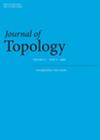Rigidity of the saddle connection complex
IF 0.8
2区 数学
Q2 MATHEMATICS
引用次数: 2
Abstract
For a half-translation surface , the associated saddle connection complex is the simplicial complex where vertices are the saddle connections on , with simplices spanned by sets of pairwise disjoint saddle connections. This complex can be naturally regarded as an induced subcomplex of the arc complex. We prove that any simplicial isomorphism between saddle connection complexes is induced by an affine diffeomorphism . In particular, this shows that the saddle connection complex is a complete invariant of affine equivalence classes of half-translation surfaces. Throughout our proof, we develop several combinatorial criteria of independent interest for detecting various geometric objects on a half-translation surface.
鞍座连接的刚性复杂
对于半平移曲面(S, q) $(S,q)$,对应的鞍连接复合体a (S,q) $\mathcal {A}(S,q)$是简单复合体,其中顶点是(S, q) $(S,q)$上的鞍连接,简单复合体是由成对不相交的鞍连接集张成的。这种配合物可以很自然地看作是电弧配合物的诱导亚配合物。我们证明了任意简单同构的φ:A (S, q)→A (S ',鞍连接配合物之间的q′)$\phi \colon \mathcal {A}(S,q) \rightarrow \mathcal {A}(S^{\prime },q^{\prime })$是由仿射微分同构F引起的:(S, q)→(S ',Q ') $F \colon (S,q) \rightarrow (S^{\prime },q^{\prime })$。特别地,这表明鞍连接复形是半平移曲面仿射等价类的完全不变量。在整个证明过程中,我们开发了几个独立的组合准则,用于检测半平移表面上的各种几何物体。
本文章由计算机程序翻译,如有差异,请以英文原文为准。
求助全文
约1分钟内获得全文
求助全文
来源期刊

Journal of Topology
数学-数学
CiteScore
2.00
自引率
9.10%
发文量
62
审稿时长
>12 weeks
期刊介绍:
The Journal of Topology publishes papers of high quality and significance in topology, geometry and adjacent areas of mathematics. Interesting, important and often unexpected links connect topology and geometry with many other parts of mathematics, and the editors welcome submissions on exciting new advances concerning such links, as well as those in the core subject areas of the journal.
The Journal of Topology was founded in 2008. It is published quarterly with articles published individually online prior to appearing in a printed issue.
 求助内容:
求助内容: 应助结果提醒方式:
应助结果提醒方式:


